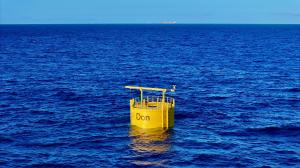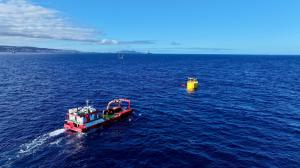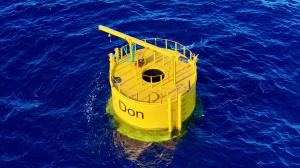EU-Funded Ocean Energy Platform Begins Testing to Prove Storm Resilience and 24/7 Power from the Sea
Ocean energy prototype “Don” begins structural testing at sea to demonstrate OTEC’s ability to deliver round-the-clock clean energy through extreme weather.
This is more than just a test of the core technology, which has already been proven to work — it’s a demonstration of resilience”
LAS PALMAS, CANARY ISLANDS, SPAIN, October 23, 2025 /EINPresswire.com/ -- A new storm-resistant ocean energy structure has been installed off the coast of Gran Canaria, marking a breakthrough in developing renewable systems capable of operating through hurricanes. Developed under the EU’s Horizon Europe–funded PLOTEC project, the prototype represents the next step in harnessing Ocean Thermal Energy Conversion (OTEC) to deliver round-the-clock clean power to island nations most exposed to climate risks.— Dan Grech
“This is more than just a test of the core technology, which has already been proven to work — it’s a demonstration of resilience,” said Dan Grech, Founder & CEO of Global OTEC. “If we can demonstrate that OTEC platforms can operate safely and continuously through extreme weather, we open a new chapter for clean baseload power in regions that need it most.”
The installation comes just weeks before COP30 and the Earthshot Prize 2025, where climate resilience and energy security for vulnerable regions are expected to top the agenda. It marks the first long-term offshore operation of an OTEC platform in decades, following early temporary demonstrations such as the historic Mini-OTEC and OTEC-1 projects, deployed in the late 1970s and early 1980s off Keahole Point, Hawaii, USA, which used a U.S. Navy barge and a converted World War II T2 tanker, respectively.
This phase involved deploying the platform’s cylindrical hull at the Oceanic Platform of the Canary Islands (PLOCAN) test site. The next phase will see the installation and connection of the cold-water pipe, completing the system ahead of full structural testing in the Atlantic environment.
During this structural testing stage, the platform will face the rough conditions of the Atlantic Ocean, allowing detailed analysis of its resistance, materials, and design. Advanced sensors from Fugro will record gyroscopic and accelerometer data to monitor the vessel’s motion and, later, the cold-water pipe’s stability, correlating these with local wave data. Previous computer simulations and a scaled tank test conducted in the UK have already verified the structure’s design at laboratory scale.
“The data collected during the tests will validate our computational models and show how accurately we can simulate the interaction between the large-diameter riser and the vessel under a range of conditions,” explains Sam Johnston, Lead Engineer at Global OTEC. It will be combined with performance data from grid-connected OTEC power plants to de-risk future projects.
The PLOTEC project aims to accelerate the renewable energy transition for tropical island states such as Barbados, which face extreme weather and remain heavily reliant on diesel generation. OTEC offers a uniquely suited solution, using the ocean — their most abundant resource — to provide stable, 24/7 clean power. This prototype, engineered to withstand tropical storms, demonstrates how OTEC could deliver resilient and reliable energy to storm-prone regions.
Beyond advancing OTEC’s role in clean energy generation, the project contributes to marine engineering, computational modelling, and the development of weather-resistant materials for offshore use. The structure is named “Don” in honour of Don Lennard, a British aircraft engineer and Royal Navy veteran who dedicated his life to advancing OTEC technology.
Testing will continue over the coming months, with performance data expected in early 2026. If successful, the results will guide the design of full-scale OTEC systems capable of powering entire island grids and offshore facilities.
PLOTEC partners
The consortium is composed of the following companies: Global OTEC (UK), Cleantech Engineering Limited (UK), WavEC Offshore Renewables (Portugal), The Oceanic Platform of the Canary Islands PLOCAN (Spain), Quality Culture (Italy), Agru Kunststofftechnik Gesellschaft m.b.H. (Austria) and University of Plymouth School of Engineering, Computing and Mathematics (UK).
About Global OTEC
Global OTEC was founded to provide clean, reliable and affordable energy from the ocean to power a diverse range of offshore applications and even entire countries, particularly tropical island nations. The company’s technology builds on decades of process expertise and OTEC demonstrations validated through international programmes.
Global OTEC has designed the first floating commercial OTEC system to transform how the world is powered and is also leading the EU-funded project PLOTEC. In parallel, the company is working ExxonMobil, BP and Petrobras through the DeepStar Consortium—a global offshore research programme led by 11 major operators, to assess how OTEC can decarbonise deepwater oil and gas operations.
About OTEC
OTEC is a renewable technology that harnesses the ocean’s thermal gradient to generate electricity. Warm surface seawater is used to vaporise a working fluid, driving a turbine to produce energy, while cold deep-sea water condenses the fluid, creating a continuous cycle. As the ocean surface remains warm year-round in tropical regions, OTEC can provide 24/7 electricity, positioning it as a sustainable energy option for tropical islands. With the advancements of the PLOTEC project, with storm-resilient structures, OTEC stands as a robust solution to power outages and quick recovery from severe tropical weather, addressing energy needs and supporting a sustainable future for island communities.
DANIEL GRECH
GLOBAL OTEC RESOURCES LTD
+44 7872 180411
dan.grech@globalOTEC.co
Visit us on social media:
LinkedIn
YouTube
Legal Disclaimer:
EIN Presswire provides this news content "as is" without warranty of any kind. We do not accept any responsibility or liability for the accuracy, content, images, videos, licenses, completeness, legality, or reliability of the information contained in this article. If you have any complaints or copyright issues related to this article, kindly contact the author above.



